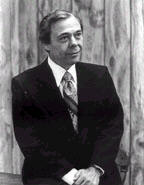 —Founder of Mattachine Midwest Early Comrades & Historian Recall His Remarkable Energies Lifelong Activist, 82, was in Terminal Stages of Heart Failure |
|
Compiled By GayToday
Basker had been living in the Jewish Home since April 2000, according to Kelley, after being diagnosed as being in the terminal stages of heart failure and finding that he could no longer live in his own apartment. "Still," Kelley notes, " until his death, he remained active on a number of agencies' and organizations' boards: In-Home Services Public Authority, NAACP San Francisco chapter, Alexander Hamilton [gay] American Legion post, and California Legislative Council for Older Americans. "I last visited him in January, when he showed remarkable energy. I talked to him once since then by phone, and he was in good enough spirits and remaining as active as possible but clearly reconciled to not living much longer. "Bob was born September 30, 1918, which means he was 82. I know he's survived by a son Wayne and a daughter Melinda in San Francisco, whom I've never met. Also, at least as recently as 1997, he had a brother living in Montreal. I haven't seen anything in the Bay Area Reporter yet about this, but I haven't searched San Francisco dailies. "I'm told there will be a memorial event on July 1, but this is not confirmed." Bob Kunst worked early-on with Bob Basker in Dade County's late 1970s struggles against Anita Bryant, the singing fundamentalist orange juice matron. Kunst expressed immediate sorrow to GayToday at hearing of Basker's death. "I do remember Bob Basker's children. He often took them with him to activist events and meetings in Miami," Kunst recalled. "He and I had a good rapport in those days. Sure, we disagreed on our Anita strategies sometime later, but I've always respected his ability to sell ideas. He was a master salesman. He was particularly effective and influential as a community liaison to the ACLU." James T. Sears, Ph.D., a Harvard-based historian and the author of the forthcoming history Rebels, Rubyfruit and Rhinestones: The Emergence of Queer Communities in the Stonewall South, has chronicled Basker's Miami era-activism. Sears' history will be published in August by Rutger's University Press. The historian visited the ailing pioneer in November when Basker, he told GayToday, was utilizing an oxygen tank. In another soon to-be-published history book Risk Takers and Trend Setters (Haworth Press) chronicling the lives of America's pre-1969 gay and lesbian pioneers and edited by the pioneering sexologist, Vern Bullough, Ph.D., Dr. Sears has contributed a chapter that highlights Bob Basker's life and achievements. Basker's first name at birth, explains Sears, had been Solomon. He'd changed that first name to Robert upon enlisting in 1941 to fight in World War II, as a way of avoiding anti-Semitism in the military. "I figured I might as well use a name that is more accommodating to getting by," he told the historian. Basker served in England, France, Belgium, Holland, and Germany. Sears continued: "Solomon Basker's parents were from a Fiddler on the Roof-type community in pre-Revolutionary Poland. Immigrating to America, they operated a grocery store in East Harlem, where Solomon, the youngest of five boys, was born in 1918. "After losing the store because of hard times, he and his family were dispossessed of their home on 109th Street. Forced to sell newspapers, there were times that they couldn't afford even tenement rent and the family was put 'out on the street.' " His New York City experiences turned the young Basker into a committed socialist. Although he was considered a radical, like many gay men in his generation, Bob Basker got married. His wife knew that he was gay and they reproduced. "Bob," explains historian Sears, "was living the quintessential fifties lifestyle in a Chicago suburb with his wife and children. However, he had not abandoned his socialist convictions (or his homosexual inclinations). During this Cold War era of loyalty oaths, the House Un-American Activities Committee, atom bomb spy trials, and blacklists, Basker was active in many 'subversive' organizations. He associated with activists like the black-listed actor and singer, Paul Robeson and 'fellow travelers' Scott Neering and Henry Noyes. Bob and his wife supported Chicago families who were Smith Act victims, hosted Russian dancers during their Chicago tour, held fundraisers for Helen Sobell, and wrote letters to local newspapers in support of racial integration." Travelling about the nation as a successful salesman for Encyclopedia Britannica, Sears tells how Basker was able to visit: "different gay communities around the country getting a sense of how groups were organized. He spent time with Mattachine leaders such as Frank Kameny in Washington, Dick Leitsch in New York, Hal Call in San Francisco. He also spent considerable time in Los Angeles at the One Institute overseen by Dorr Legg. He subscribed to the Mattachine Review and ONE Magazine as well as attended national homophile conferences. Locally, he tried to organize in Chicago's gay bars which were subject to erratic raids, including one that resulted in mass arrests, names published in the newspaper, and several suicides. 'I'd ask the bartender if I could talk to different people around the bar. It was very difficult to get the customers to understand the usefulness of the movement. On the contrary, the reaction I got was: 'You're creating waves and just going to get us into trouble.' " Finally, after gathering the names of several of Chicago's wrongly-arrested gay males and collecting the phone numbers and addresses provided by national gay groups, Bob Basker and a few other forward-looking thinkers formed Mattachine Midwest. |


